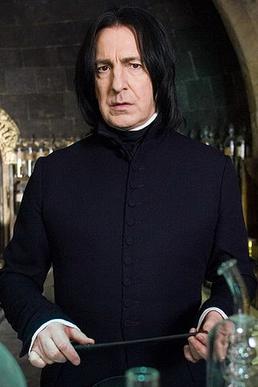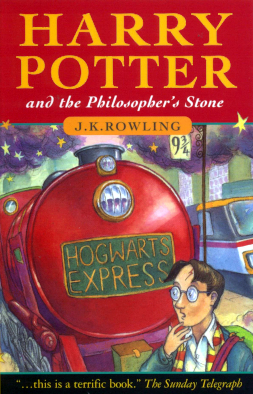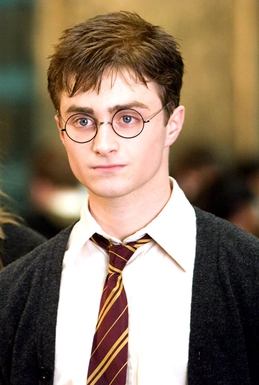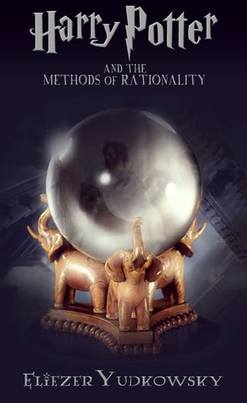
Severus Snape is a fictional character in J. K. Rowling's Harry Potter series. He is an exceptionally skilled wizard whose extremely cold and resentful exterior conceals deep emotions and anguish. A Professor at Hogwarts School of Witchcraft and Wizardry, Snape is hostile to Harry due to his resemblance to his father James Potter, who bullied Snape during their time together at Hogwarts.

Prof. Albus Percival Wulfric Brian Dumbledore is a fictional character in J. K. Rowling's Harry Potter series. For most of the series, he is the headmaster of the wizarding school Hogwarts. As part of his backstory, it is revealed that he is the founder and leader of the Order of the Phoenix, an organisation dedicated to fighting Lord Voldemort, the main antagonist of the series.

Harry Potter and the Philosopher's Stone is a fantasy novel written by British author J. K. Rowling. The first novel in the Harry Potter series and Rowling's debut novel, it follows Harry Potter, a young wizard who discovers his magical heritage on his eleventh birthday, when he receives a letter of acceptance to Hogwarts School of Witchcraft and Wizardry. Harry makes close friends and a few enemies during his first year at the school and with the help of his friends, Ron Weasley and Hermione Granger, he faces an attempted comeback by the dark wizard Lord Voldemort, who killed Harry's parents, but failed to kill Harry when he was just 15 months old.

The Order of the Phoenix is a secret organisation in the Harry Potter series of fiction books written by J. K. Rowling. Founded by Albus Dumbledore to fight Lord Voldemort and his followers, the Death Eaters, the Order lends its name to the fifth book of the series, Harry Potter and the Order of the Phoenix.
In J. K. Rowling's Harry Potter series, magic is depicted as a supernatural force that can be used to override the usual laws of nature. Many fictional magical creatures exist in the series, while ordinary creatures also sometimes exhibit magical properties. Magical objects are also described. Witches and wizards refer to the rest of the population, who are generally unaware of magic, as "Muggles" in the United Kingdom and "No-Maj" in the United States.

Dumbledore's Army is a fictional student organisation in J. K. Rowling's Harry Potter series that is founded by the main characters, Harry Potter, Ron Weasley and Hermione Granger, to stand up against the regime of Hogwarts High Inquisitor Dolores Umbridge, as well as to learn practical Defence Against the Dark Arts. It was founded in the fifth book, Harry Potter and the Order of the Phoenix.

Harry Potter and the Philosopher's Stone is a 2001 fantasy film directed by Chris Columbus and produced by David Heyman, from a screenplay by Steve Kloves, based on the 1997 novel of the same name by J. K. Rowling. It is the first instalment in the Harry Potter film series. The film stars Daniel Radcliffe as Harry Potter, with Rupert Grint as Ron Weasley, and Emma Watson as Hermione Granger. Its story follows Harry's first year at Hogwarts School of Witchcraft and Wizardry as he discovers that he is a famous wizard and begins his formal wizarding education.

Harry James Potter is a fictional character and the titular protagonist in J. K. Rowling's series of eponymous novels. The majority of the books' plot covers seven years in the life of the orphan Harry, who, on his eleventh birthday, learns he is a wizard. Thus, he attends Hogwarts to practise magic under the guidance of the kindly headmaster Albus Dumbledore and other school professors along with his best friends Ron Weasley and Hermione Granger. Harry also discovers that he is already famous throughout the novel's magical community, and that his fate is tied with that of Lord Voldemort – the internationally feared Dark Wizard and murderer of his parents, James and Lily Potter. The book and film series revolve around Harry's struggle to adapt to the wizarding world and defeat Voldemort.
The following is a list of magical objects used in the fictional universe of Harry Potter in the original book series, as well as in the adapted film series.

The following fictional characters are staff members and denizens of Hogwarts in the Harry Potter books written by J. K. Rowling.

Harry Potter and the Philosopher's Stone is an action-adventure video game based on the 2001 film of the same name. Philosopher's Stone was initially released for Microsoft Windows and the PlayStation in November 2001. A different game bearing the same name was made two years later for the GameCube, PlayStation 2, and Xbox in December 2003. The versions on different platforms differ greatly from each other and do not follow the same level structures or gameplay, with somewhat varying stories as well.
Harry Potter is a series of fantasy novels by J. K. Rowling.

Rubeus Hagrid is a fictional character in the Harry Potter book series written by J. K. Rowling. He is introduced in Harry Potter and the Philosopher's Stone as a half-giant and half-human who is the gamekeeper and Keeper of Keys and Grounds of Hogwarts, the primary setting for the first six novels. In the third novel Harry Potter and the Prisoner of Azkaban, Hagrid is promoted to Care of Magical Creatures professor, and is later revealed to be a member of the Order of the Phoenix. A loyal, friendly, softhearted personality who is easily brought to tears, he is also known for his thick West Country accent.

Harry Potter and the Methods of Rationality (HPMOR) is a Harry Potter fan fiction by Eliezer Yudkowsky, published on FanFiction.Net. It adapts the story of Harry Potter to explain complex concepts in cognitive science, philosophy, and the scientific method. Yudkowsky published HPMOR as a serial from February 28, 2010 to March 14, 2015, totaling 122 chapters and about 660,000 words.

A Very Potter Sequel is a musical with music and lyrics by Darren Criss and a book by Matt Lang, Nick Lang, and Brian Holden. The story is a parody, based on several of the Harry Potter novels by J. K. Rowling, as well as their film counterparts.

A Very Potter Musical is a musical with music and lyrics by Darren Criss and A. J. Holmes and a book by Matt Lang, Nick Lang and Brian Holden. The story is a parody, based on several of the Harry Potter novels by J. K. Rowling, as well as their film adaptations.

Professor Minerva McGonagall is a fictional character in J. K. Rowling's Harry Potter series. Professor McGonagall is a professor at Hogwarts School for Witchcraft and Wizardry, the head of Gryffindor House, the professor of Transfiguration, the Deputy Headmistress under Albus Dumbledore and a member of the Order of the Phoenix. Following Lord Voldemort's defeat at the hands of her student Harry Potter and the deaths of Headmasters Albus Dumbledore and Severus Snape, McGonagall takes the position of Headmistress. McGonagall was originally portrayed in the film adaptations by actress Maggie Smith, and later by Fiona Glascott in the Fantastic Beasts prequel films The Crimes of Grindelwald and The Secrets of Dumbledore.

Harry Potter and the Philosopher's Stone is an action-adventure video game based on the 2001 film of the same name. Developed by Warthog Games and released in December 2003 for the GameCube, PlayStation 2, and Xbox, it is the second set of games to have this title following a release of the same name in 2001.

Harry Potter and the Philosopher's Stone is a 2001 video game developed by Griptonite Games and published by Electronic Arts for the Game Boy Advance. Based on the 1997 novel of the same name, the player controls Harry Potter, who must navigate his first year in the Hogwarts School of Witchcraft and Wizardry and eventually confront the villainous Lord Voldemort.


















